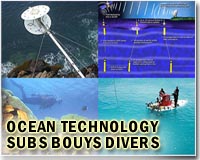| . |  |
. |
Canberra, Australia (SPX) Nov 26, 2010 A measure widely advocated as a means of assessing the health of marine ecosystems is an ineffective guide to trends in biodiversity, and more direct monitoring is needed, a new study has found. The findings followed an examination of whether changes in fishery catches reflect changes in the structure of marine food webs, and therefore are a suitable guide to assess the impacts of fishing on marine ecosystem health. CSIRO Wealth from Oceans Flagship scientist, Dr Beth Fulton, and Dr Sean Tracey from the Tasmanian Aquaculture and Fisheries Institute at the University of Tasmania, were members of the international team involved in the study. "Biodiversity indicators are used to track the impacts of fishing as a guide to management effectiveness," Dr Fulton said. "The most widely adopted indicator of biodiversity in the ocean at a global scale is the 'average trophic level' (position in the food chain) determined from fishery catches. "This is intended to detect shifts from high-trophic-level predators such as Atlantic cod and tunas to low-trophic-level fish, invertebrates and plankton-feeders such as oysters." Dr Tracey said the study was the first large-scale test of whether average trophic level determined by fishery catch is a good indicator of ecosystem average trophic level, marine biodiversity and ecosystem status. "We looked at average trophic level determined from a range of sources including global fishery catches, long-term surveys, stock assessments and complex computer modelling for marine ecosystems around the world," Dr Tracey said. "In contrast to previous findings, which reported declines in catch average trophic level thought to be due to the loss of large fish and the increasing catch of small fish, we found that catches are increasing at most levels of marine food webs and that the average trophic level has actually increased in the past 25 years. "We also found that average trophic level determined from fishery catches does not reliably measure the magnitude of fishing impacts or the rate at which marine ecosystems are being altered by fishing." Dr Tracey says global fisheries are at a crucial turning point, with high fishing pressure being offset in some regions by rebuilding efforts. Relying on the average trophic level of catch could mislead policy development. Dr Fulton said that, to target limited resources in the best way, researchers should focus on assessing species vulnerable to fishing that are not currently assessed effectively "We also need to develop and expan trend-detection methods that can be applied more widely, particularly to countries with few resources for science and assessment. "Through such efforts we can better detect and convey the true impact of fisheries on marine biodiversity," Dr Fulton said. Led by University of Washington fisheries scientist, Trevor A. Branch, the study's findings are published in a letter in Nature entitled: "The trophic fingerprint of marine fisheries".
Share This Article With Planet Earth
Related Links CSIRO Marine and Atmospheric Research Water News - Science, Technology and Politics
 Australia moves to protect bluefin tuna
Australia moves to protect bluefin tunaSydney (AFP) Nov 25, 2010 Australian has announced new measures to protect stocks of southern bluefin tuna, whose numbers are being threatened by the rising global popularity of sushi food. Environment Minister Tony Burke said the fish would be listed as "conservation-dependent", meaning it would be covered by new management plans to stop over-fishing. "While ongoing improvement in management measures are helping ... read more |
|
| The content herein, unless otherwise known to be public domain, are Copyright 1995-2010 - SpaceDaily. AFP and UPI Wire Stories are copyright Agence France-Presse and United Press International. ESA Portal Reports are copyright European Space Agency. All NASA sourced material is public domain. Additional copyrights may apply in whole or part to other bona fide parties. Advertising does not imply endorsement,agreement or approval of any opinions, statements or information provided by SpaceDaily on any Web page published or hosted by SpaceDaily. Privacy Statement |